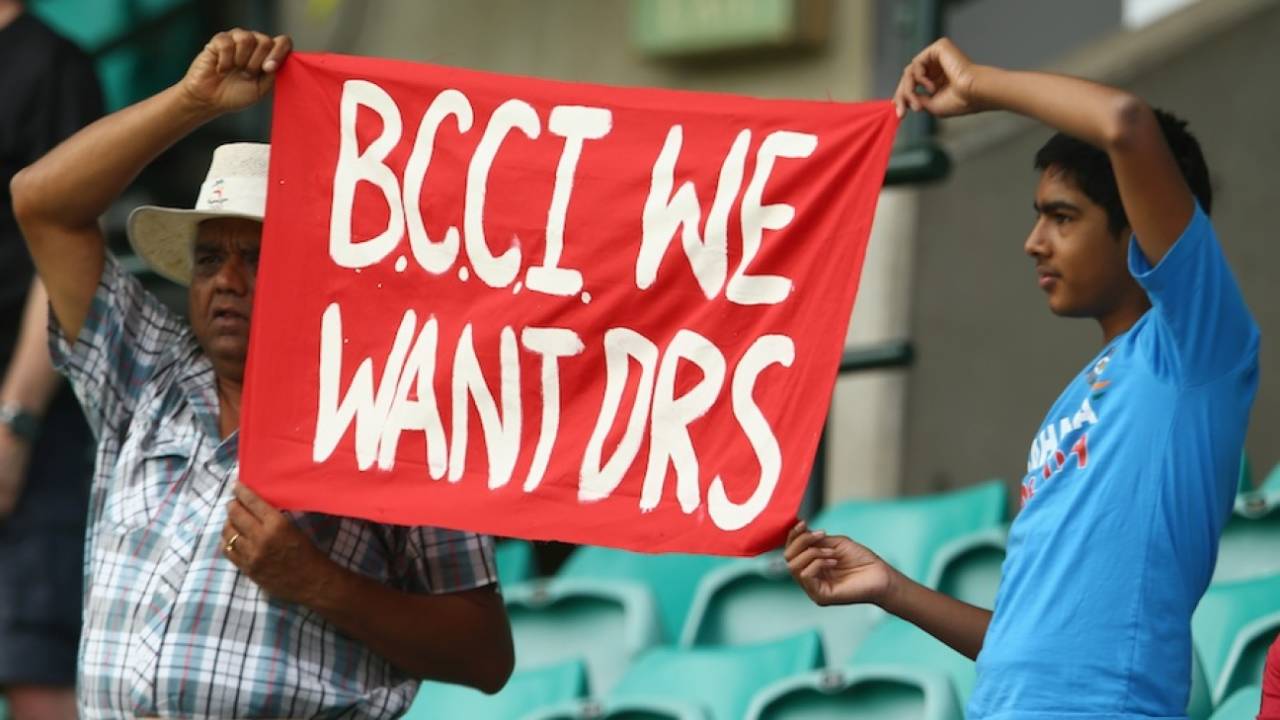IPL to feature DRS for the first time
Each team will get one review per innings, and the third umpire will have access to both ball-tracking and Ultra Edge
Nagraj Gollapudi
21-Mar-2018
A couple of fans make their stance on DRS clear to the BCCI • Getty Images
In its eleventh season, the IPL will finally feature the Decision Review System (DRS). From the 2018 season-opener on April 7, each team will get one review per innings, and the third umpire will have access to both ball-tracking and Ultra Edge. The Pakistan Super League (PSL) became the first T20 tournament to use the DRS, when it did so during the play-off stages of the 2017 season.
The use of DRS in T20 is fairly new - it was only from October 1 last year that the ICC made DRS mandatory in T20 internationals. The ICC has not used the DRS during the World Twenty20 editions held so far, but is likely to use it for the time being during the Women's World T20, scheduled to be played in the West Indies later this year.
India was the last major country to adopt DRS and only began using the system for home games during the home Test series against England in 2016-17.
According to a senior Indian match official, the DRS has been introduced belatedly in the IPL because of the "misconception" some of the decision-makers within the BCCI had held about the system in the past. "In T20s, one decision makes a huge difference," this official said. "People have a misconception that only the longer format of the game needs DRS. But, in the longer version, there is enough time to absolve a mistake you make. But in T20s, you don't have such time. If a good, in-form batsman is given a wrong decision, that can finish off the game completely."
The quality of umpiring, especially of the Indian match officials, has been a subject of intense debate for several years, with many prominent players unhappy with on-field decisions, which they complained were inaccurate and inconsistent. Last year, MS Dhoni, who was representing Rising Pune Supergiant, was fined by the IPL for breaching the code of conduct after he made the T-signal in jest, asking for a review in a match against Mumbai Indians despite knowing there was no DRS.
To address the issue the BCCI conducted a DRS workshop for ten Indian umpires last December. That workshop was conducted by Dennis Burns, the ICC umpires coach, in Vizag. At the workshop, Burns stressed the need for the umpires, in case they act as the third umpire who will review the on-field call, to not get swayed by the high-pressure environment of a T20 match. The need to follow the protocol at all times was the most essential, one umpire who attended the workshop said.
It is understood the IPL will conduct another seminar for umpires and match officials on April 3 and 4 which will also feature a session on DRS. Umpires agreed that the DRS would ease the pressure on them. "DRS is good for the game," one Indian umpire, who is also on the ICC's international panel, said. "No one wants to make a mistake on-field. With the DRS the evidence is conclusive and the decision gets corrected. And because of error, the players cannot then complain the decision went against them."
While the decision was made public today by IPL chairman Rajeev Shukla, he did not comment on who would pay for the DRS. In international cricket the norm has been for the broadcaster to pay for the DRS. Star India paid a record-breaking $2.55 bn late last year to bag the global media rights for IPL for the next five years.
Nagraj Gollapudi is a senior assistant editor at ESPNcricinfo
